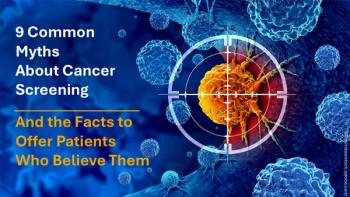
Proscar Exonerated as Trigger for High-Grade Prostate Cancer
SAN ANTONIO -- Proscar (finasteride) increased the sensitivity of prostate specific antigen (PSA) testing for both overall and high-grade prostate cancer, according to an analysis of a large trial, and did not perpetrate any extra aggressive malignancies.
SAN ANTONIO, Aug. 16 -- Proscar (finasteride), the 5?-reductaste inhibitor, increased the sensitivity of PSA testing for both overall and high-grade prostate cancer, according to an analysis of a large trial, and did not perpetrate any aggressive malignancies.
This analysis was spurred by results of the seven-year Prostate Cancer Prevention Trial (PCPT) in which men in the Proscar arm had a 24.8% reduced risk of prostate cancer compared with placebo patients. However, they also had a small but statistically significant increase of malignancies with high Gleason scores.
But because of the increased sensitivity of PSA testing with the use of Proscar, the increase in aggressive tumors could only have been expected, wrote Ian Thompson, M.D., of the University of Texas here, and colleagues, in the Aug. 16 issue of the Journal of the National Cancer Institute.
The fact that the increased hazard ratio for detecting high-grade tumors appeared early and did not increase with time was inconsistent with the theory that Proscar induced high-grade disease, they concluded.
The increase in high-grade tumors (Gleason 7-10) in Proscar patients (37%) versus placebo control (22.2%) dampened interest in using Proscar to prevent prostate cancer, wrote Dr. Thompson, and colleagues. Proscar is FDA-approved to ease symptoms of benign prostatic hyperplasia.
The trial was closed a year earlier than planned because the primary objective--reduction in prostate cancer risk--had been achieved. To clarify the role of Proscar, the researchers studied men in the placebo and Proscar groups of the PCPT who had had a prostate biopsy with concurrent PSA testing during the study.
In their analysis, prostate cancer was detected in 1,111 of 5,112 men (22%) in the placebo group, the researchers reported. Gleason tumor grade was available for 1,100 of the placebo men, of whom 240 had grade 7 or higher and 55 had grade 8 or higher.
Of 4,579 men taking Proscar, 695 had prostate cancer (15%). Gleason grade was available for 686 men, of whom 264 had grade 7 or higher, and 81 had grade 8 or higher.
The receiver operating characteristic curve (AUC) of PSA for all outcomes was greater for the Proscar group than for the placebo group, the researchers reported. The AUC of PSA, a measure of diagnostic accuracy, is a biomarker that has widespread use in the U.S. and is better at detecting higher-grade prostate cancer than lower-grade cancer, the researchers said.
For detecting prostate cancer versus no cancer, the AUCs were 0.757 and 0.681, respectively (P < 0.001); for detecting Gleason grade ? 7 versus ? 6 or no cancer, the AUCs were 0.838 and 0.781, respectively (P =0.003); and for detecting Gleason grade ? 8 versus ? 7 or no cancer, the AUCs were 0.886 and 0.824, respectively (P = 0.071), the researchers reported.
The sensitivity of PSA was higher for men taking Proscar than for those given a placebo at all PSA cutoffs matched by specificity, the researchers reported. Thus, they said, PSA's significantly better sensitivity and better AUC for detecting prostate cancer among the Proscar patients would be expected to contribute to greater detection of all grades of prostate cancer.
Moreover, he added, the difference in the absolute numbers of high-grade tumors found in for-cause biopsies (i.e. those done for an elevated PSA or a digital rectal exam) was not seen in the end-of-study (not-for-cause) biopsies.
Among the advantages of Proscar, the researchers wrote, is that the drug led to significant improvements in the AUC of PSA for prostate cancer detection, an accomplishment that is otherwise difficult to attain. In fact, they wrote, this effect of Proscar on the sensitivity of PSA may have been at least in part responsible for the increased detection of high-grade disease in the PCPT.
The study had several potential limitations, the researchers wrote. The conclusions may not apply to other populations, as the men in the study were generally healthy, predominantly white, with a median age of 72 at the outset.
In addition, not all men who were advised to have a biopsy did so, whereas more men in the placebo arm accepted the recommendation. Nevertheless, the researchers said, the high rate of end-of-study biopsies regardless of PSA and rectal exam results were equal in both arms, suggesting that none of these factors biased the results.
The central finding of this analysis, namely that Proscar increased the sensitivity of PSA testing for both overall and high-grade cancer, had three major implications, the researchers wrote. First, the increased risk of high-grade disease in the PCPT was due, at least in part to improved detection, rather than the induction of high-grade disease. Second, Proscar may improve the performance of PSA screening in the general population.
And finally, Dr. Thompson said, because PSA testing was better in the Proscar group, the 24.8% decrease in the seven-year prevalence of prostate cancer reported in the PCPT is likely to be an underestimate of the actual reduction in prostate cancer risk with Proscar.
Newsletter
Enhance your clinical practice with the Patient Care newsletter, offering the latest evidence-based guidelines, diagnostic insights, and treatment strategies for primary care physicians.

































































































































